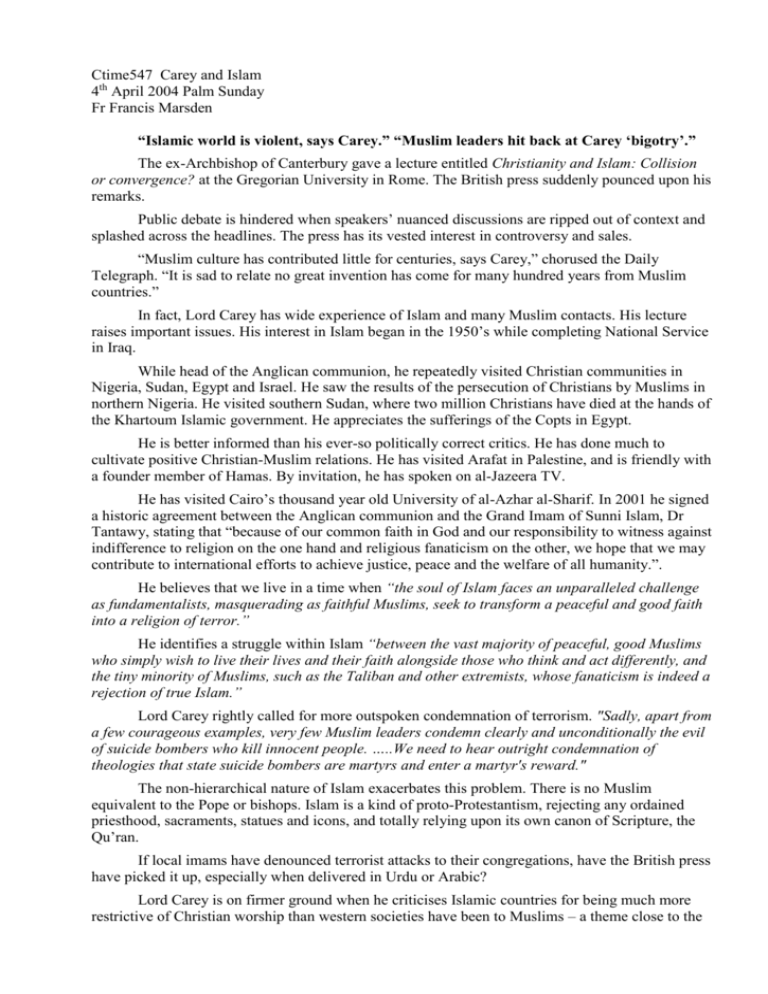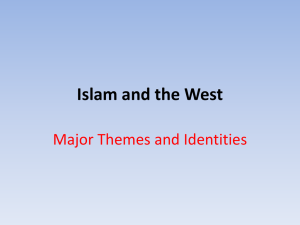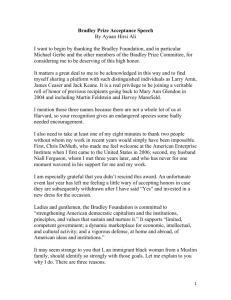Saving Islam from the evangelists
advertisement

Ctime547 Carey and Islam 4th April 2004 Palm Sunday Fr Francis Marsden “Islamic world is violent, says Carey.” “Muslim leaders hit back at Carey ‘bigotry’.” The ex-Archbishop of Canterbury gave a lecture entitled Christianity and Islam: Collision or convergence? at the Gregorian University in Rome. The British press suddenly pounced upon his remarks. Public debate is hindered when speakers’ nuanced discussions are ripped out of context and splashed across the headlines. The press has its vested interest in controversy and sales. “Muslim culture has contributed little for centuries, says Carey,” chorused the Daily Telegraph. “It is sad to relate no great invention has come for many hundred years from Muslim countries.” In fact, Lord Carey has wide experience of Islam and many Muslim contacts. His lecture raises important issues. His interest in Islam began in the 1950’s while completing National Service in Iraq. While head of the Anglican communion, he repeatedly visited Christian communities in Nigeria, Sudan, Egypt and Israel. He saw the results of the persecution of Christians by Muslims in northern Nigeria. He visited southern Sudan, where two million Christians have died at the hands of the Khartoum Islamic government. He appreciates the sufferings of the Copts in Egypt. He is better informed than his ever-so politically correct critics. He has done much to cultivate positive Christian-Muslim relations. He has visited Arafat in Palestine, and is friendly with a founder member of Hamas. By invitation, he has spoken on al-Jazeera TV. He has visited Cairo’s thousand year old University of al-Azhar al-Sharif. In 2001 he signed a historic agreement between the Anglican communion and the Grand Imam of Sunni Islam, Dr Tantawy, stating that “because of our common faith in God and our responsibility to witness against indifference to religion on the one hand and religious fanaticism on the other, we hope that we may contribute to international efforts to achieve justice, peace and the welfare of all humanity.”. He believes that we live in a time when “the soul of Islam faces an unparalleled challenge as fundamentalists, masquerading as faithful Muslims, seek to transform a peaceful and good faith into a religion of terror.” He identifies a struggle within Islam “between the vast majority of peaceful, good Muslims who simply wish to live their lives and their faith alongside those who think and act differently, and the tiny minority of Muslims, such as the Taliban and other extremists, whose fanaticism is indeed a rejection of true Islam.” Lord Carey rightly called for more outspoken condemnation of terrorism. "Sadly, apart from a few courageous examples, very few Muslim leaders condemn clearly and unconditionally the evil of suicide bombers who kill innocent people. …..We need to hear outright condemnation of theologies that state suicide bombers are martyrs and enter a martyr's reward." The non-hierarchical nature of Islam exacerbates this problem. There is no Muslim equivalent to the Pope or bishops. Islam is a kind of proto-Protestantism, rejecting any ordained priesthood, sacraments, statues and icons, and totally relying upon its own canon of Scripture, the Qu’ran. If local imams have denounced terrorist attacks to their congregations, have the British press have picked it up, especially when delivered in Urdu or Arabic? Lord Carey is on firmer ground when he criticises Islamic countries for being much more restrictive of Christian worship than western societies have been to Muslims – a theme close to the heart of Evangelicals and Catholics. The right to build a church in Riyadh would have been a fair exchange for constructing a mosque in Rome. Although some Islamic states accommodate minority faiths like Judaism and Christianity, they do so only at the price of taxation, the jizya or soul tax, and severe disabilities in housing, in employment, in civic rights. The fundamental question is this: Why has the West has progressed but Islamic societies are relatively backward? Lord Carey noted: “Throughout the Middle East and north Africa, we find authoritarian regimes with deeply entrenched leadership, some of which rose to power at the point of a gun and are retained in power by massive investment in security forces. Whether they are military dictatorships or traditional sovereignties, each ruler seems to be committed to retaining power and privilege.” However, the same could have been said 70 years ago of many European monarchies and the Fascist dictatorships. Widespread democracy, as we now know it, is a relatively recent phenomenon. Islam enjoyed its Golden Age ca. 800-1250 A.D. during the great Caliphates of Baghdad and Cordoba. Architecture, calligraphy, poetry, philosophy and science flourished. Extensive bodies of literature were composed in Arabic, Persian, and Urdu. Our numbers, algebra, much medicine and astronomy came from Arab culture. Our knowledge of ancient Greek philosophy came largely via Arabic translations of Plato and Aristotle. For centuries in Mozarabic Spain, Islamic and Christian scholars lived and discussed together. Islamic fine arts, Mudejar architecture, painting and ceramics had an important influence in the Christian west. Muslim irrigation and agriculture in southern Spain was far more advanced than Christian technology. Despite Islam’s earlier advantage, the Christian west ultimately proved a more fertile seedbed for scientific investigation. The foundations of western science were laid in the thirteenth century, when ancient Greek scientific ideas were combined with the Christian doctrine of Creation, by the likes of Roger Bacon (Franciscan), Aquinas, or Oresme and Buridan who worked on basic physics. Islam has its Nobel prizewinners today, but it simply failed to produce characters like da Vinci, Copernicus, Galileo and Newton. After the defeat of the Turks at Lepanto (1571) and Vienna (1683), the Islamic nations progressed little, while the West grew increasingly powerful. During the colonial era, many Muslim countries were humiliated under the yoke of Britain, France and Spain. The classical Islamic attitude towards knowledge is different from that in Christianity. In Islam, the primary quality of a scholar is an excellent memory, in order to memorise the Qu’ran and the hadiths, because all knowledge is first and foremost in those writings. The Qu’ran is believed to be the perfect copy of a perfect book in heaven, dictated to Mohammed. This leaves little room for critical or textual analysis. The Islamic concept of God is therefore static and fixed. There is little room for the development of doctrine. Fundamentalists accuse speculative thinkers of betraying Qu’ranic truth. In Christianity, a scholar accepts the deposit of faith, but beyond that develps the capacity to analyse, to reason, to weigh up evidence and arguments critically. The Christian understanding of the Trinity is far more dynamic. The Holy Spirit leads us into all truth, allowing doctrine to develop, but not to mutate. Our understanding of the revealed Word deepens across the centuries. Moreover, man is a co-creator with God, not a passive tool. He fashions and subdues the world, developing its resources to serve himself and his neighbour. Islam has less emphasis on human free will, and is more fatalistic. Nothing comes to pass, good or bad, except by the divine will. What ever will be, will be - insh’Allah. If God wills. Allah is not limited by moral considerations of good or evil. He alone chooses whether to forgive or damn a person. Such a theology can paralyse initiative and induce passivity. Moreover Christianity is a religion of salvation and resurrection. Christ offers a new start even to the worst sinners. Islam does not: it is a religion of law, of submission to the will of Allah, who will weigh all one’s deeds in judgement. There is no Saviour. Many Muslims are afraid to convert to Christianity because of fatwas, death-threats and their families completely.cutting them off. These are perhaps the deeper reasons behind Christian dynamism and Islamic stagnation. Christians err, however, if they judge other nations solely in terms of technological progress or political power. Many Muslims correctly view the West as immoral and debauched. But they err when they identify Christianity with this secular West Western governments create resentment when, for their own economic motives, they prop up dictatorships in Islamic countries. However, Muslims need to appreciate that the character of Mohammed, their founder, is severely blemished in Christian eyes. Christians question his claim to be a conveyor of divine revelation. He is a poor role model in comparison with Jesus. He appears tortured by demons of power and sexuality, a soul badly in need of redemption, not a prophet teaching the way to salvation. He assembled eleven wives, plus several slave-concubines. One wife was a daughter-in law. Another was Aisha, a mere child, with whom he commenced sex when she was 9 and he was 53. He spread Islam in Arabia by threatening to behead those tribes who refused to accept his new creed. He approved the murder of various opponents. He killed 700 Jewish prisoners-of-war of the Qureishi tribe. No amount of pious hagiography can whitewash these historical facts, recorded in the Hadith. Islam has grown wider and broader than Mohammed’s creed. Muslims today are generally kinder and gentler than their founder. It is hardly surprising if they prefer to live in open western societies, rather than in closed Islamic nations.









